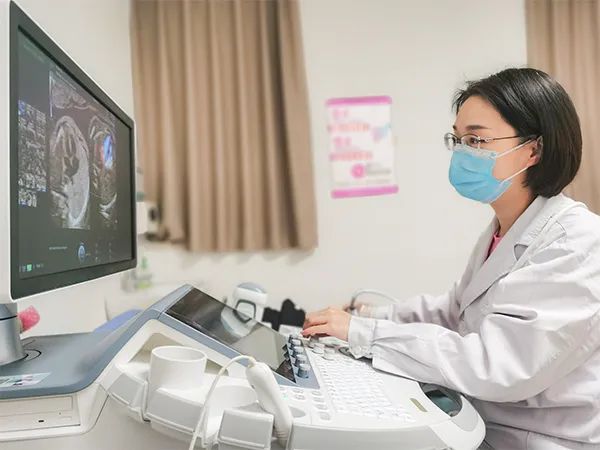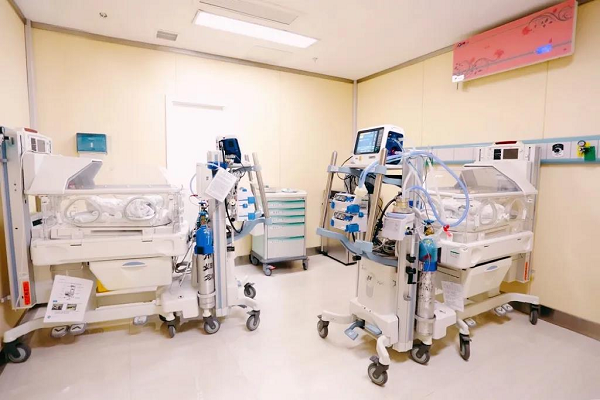CQHCWC offers considerate services for TTTS treatment and care
The Chongqing Health Center for Women and Children, or CQHCWC – located in Southwest China's Chongqing – is offering efficient and compassionate help in what is known as TTTS, or twin-to-twin transfusion syndrome.
What is TTTS
TTTS refers to a clinical condition in which one fetus in twins transfers blood through the placental vascular branch to the other fetus. It is a unique complication of monochorionic twins.
Harm of TTTS
Untreated TTTS will lead to a pregnancy failure rate of 80-100 percent, while a fetus lucky enough to survive will have a probability of about 30 percent to have brain injury after birth.
How to treat TTTS
1. Before 28 weeks of gestation, fetoscopic photocoagulation of communicating placental vessels is recommended for mothers with Ⅱ-Ⅳ of TTTS.
2. After 28 weeks of gestation, individualized treatment plans will be adopted for mothers with Ⅱ-Ⅳ of TTTS – according to the actual condition.
3. Some mothers with slowly progressing TTTS can choose anticipatory or amniotic fluid reduction therapy.
Why should you choose CQHCWC to treat TTTS
1. The center has a strong team with exceptional equipment
The Perinatal Surgical Department
Offering 42 beds for patients, the department is one of the few teams in China that can offer a full range of fetal intrauterine treatment services. It has completed Asia's first fetoscopic upper airways obstruction incision and tracheal recanalization. The survival rate of twins in the treatment of fetoscopic photocoagulation of communicating placental vessels for TTTS is stable at more than 85 percent, while the survival rate of at least one child is 92 percent, reaching the domestic and international leading level.

A medical technician monitors apparatus at the Ultrasonography Department of the CQHCWC. [Photo/CQHCWC]
The Ultrasonography Department
Equipped with nearly 50 high-end color Doppler ultrasound diagnostic apparatuses, the department's prenatal ultrasound screening technologies – such as fetal system ultrasound and fetal echocardiography – are among the best in Chongqing. The department is also noted for its consultation and diagnoses of difficult and severe obstetric ultrasound cases, boasting a wealth of experience in the evaluation of complex twins.
The Obstetrics Second Department
The department is noted for its specialty in twins, offering 56 beds for patients, including family wards and general wards. The department provides professional treatment and management for twins. In 2020, the number of twins deliveries in the department accounted for 20.31 percent of the total in the city. The average gestational week of childbirth was 35.3 weeks, while the longest extended gestational week was 73 days (10+ weeks), which was longer than the averages of both China and the United States. The survival rate of twin preterm infants at the department was 99.55 percent and that of preterm twins born at younger than 32 gestational weeks reached 84.85 percent in 2020.

A selection of equipment stands ready for use, at the Neonatal Department of the CQHCWC. [Photo/CQHCWC]
The Neonatal Department
As a critically ill neonatal treatment center in Chongqing, the department is equipped with China's first Giraffe Shuttle in-hospital transfer vehicle for newborns, providing professional and comprehensive treatment for newborns and at the same time improving their survival rate. The youngest gestational age of preterm infants successfully treated at the department is 25 weeks, with the lowest birth weight of 660 grams. The overall survival rate of preterm infants is 98.90 percent, while that for infants with ultra-low and extremely-low birth weights is 78.43 percent and 97.64 percent, respectively – making the department a leader in Chongqing and a top-level facility in the country.
2. The center offers fast-track channels, as necessary
For patients with TTTS that are assessed as requiring emergency surgery, the CQHCWC will open fast-track channels to outpatient clinics, ultrasound examinations, hospital admissions and anesthesia surgery arrangements, in order to offer more timely treatment for them.
3. Providing one-stop prepartum to postpartum period services
Joining hands with the University of Magdeburg in Germany, the CQHCWC has established a perinatal medicine center meeting the German Class I – the highest-level standard – providing one-stop services from prenatal diagnosis and evaluation, delivery, to treatment and care for postpartum recovery.
The obstetrics and pediatrics departments have cooperated to complete multiple intrapartum surgeries. By adopting pre-partum to postpartum whole-process integrative treatment, the center ensures that every high-risk pregnant woman and newborn can be treated more safely, effectively and quickly.
How to make an appointment
1. WeChat official account for outpatient services – expert outpatient clinic – Qi Hongbo
Time: 8 am-noon on Tuesday
Address: Area C, 4th Floor, Outpatient Clinic, Ranjiaba Branch of the CQHCWC
2. WeChat official account for outpatient services – expert outpatient clinic – Wang Lan
Time: All day on Wednesday
Address: Area C, 4th Floor, Outpatient Clinic, Ranjiaba Branch of the CQHCWC
3. WeChat official account for outpatient services – expert outpatient clinic – Chen Gongli
Time: 8 am-noon on Monday, Tuesday and Thursday
Address: Area C, 4th Floor, Outpatient Clinic, Ranjiaba Branch of the CQHCWC
Tel for 24-hour consultation: 023-60354526

 CQHCWC: Nurture healthier futures for children
CQHCWC: Nurture healthier futures for children How to help children develop healthy eating habits
How to help children develop healthy eating habits Wechat
Wechat Weibo
Weibo